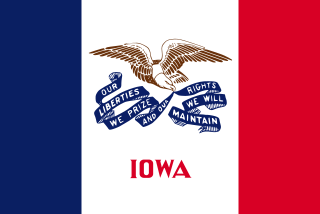The Federal Marriage Amendment (FMA) was a proposed amendment to the United States Constitution that would define marriage in the United States as a union of one man and one woman. The FMA would also prevent judicial extension of marriage rights to same-sex or other unmarried heterosexual couples. An amendment to the U.S. Constitution requires the support of two thirds of each house of Congress and ratification by three fourths of the states. The last Congressional vote on the proposed amendment occurred in the House of Representatives on July 18, 2006, when the motion failed 236 to 187, falling short of the 290 votes required for passage in that body. The Senate has only voted on cloture motions with regard to the proposed amendment, the last of which was on June 7, 2006, when the motion failed 49 to 48, falling short of the 60 votes required to allow the Senate to proceed to consideration of the proposal and the 67 votes required to send the proposed amendment to the states for ratification.

Proposition 22 was a law enacted by California voters in March 2000 to prevent marriage between same-sex couples. In May 2008, it was struck down by the California Supreme Court as contrary to the state constitution.

Proposition 60 was an amendment of the Constitution of California, enacted in 2004, guaranteeing the right of a party participating in a primary election to also participate in the general election that follows. It was proposed by the California Legislature and approved by the voters in referendum held as part of the November 2004 election, by a majority of 67%.

Proposition 62 was a California ballot proposition on the November 2, 2004 ballot. It failed to pass with 5,119,155 (46.1%) votes in favor and 5,968,770 (53.9%) against.
Same-sex marriage is legal in the U.S. state of California, and first became so on June 16, 2008, when the state began issuing marriage licenses to same-sex couples as the result of the Supreme Court of California ruling in In re Marriage Cases, which found that barring same-sex couples from marriage violated the state's Constitution. The issuance of those licenses was halted during the period of November 5, 2008 through June 27, 2013 due to the passage of Proposition 8—a state constitutional amendment barring same-sex marriages. The granting of same-sex marriages recommenced following the United States Supreme Court decision in Hollingsworth v. Perry, which restored the effect of a federal district court ruling that overturned Proposition 8 as unconstitutional.

Many U.S. states enacted amendments to their state constitutions which prevented the recognition of some or all types of same-sex unions, but all such amendments were struck down by the Supreme Court of the United States on June 26, 2015, in the case of Obergefell v. Hodges. Some amendments prevented a state from legalizing same-sex marriage, civil unions and domestic partnerships, while others banned only same-sex marriage. By May 2012, voters in 30 states had approved such amendments. While the actual text of these amendments still remains written into the various state constitutions, the Obergefell decision has rendered them unenforceable insofar as they prevented same-sex couples from marrying.

The Arizona state elections of 2006 were held on November 7, 2006. All election results are from the Arizona Secretary of State's office. Percentages may not add to 100 because of rounding.

Arizona Proposition 107 was a proposed same-sex marriage ban, put before voters by ballot initiative in the 2006 General Election. If passed, it would have prohibited the state of Arizona from recognizing same-sex marriages or civil unions. The state already had a statute defining marriage as the union of a man and a woman and prohibiting the recognition of same-sex marriages performed elsewhere.

Ballot Measure 2 of 1998 is a ballot measure, since ruled unconstitutional, that added an amendment to the Alaska Constitution that prohibited the recognition of same-sex marriage in Alaska. The Ballot measure was sparked by the lawsuit filed by Jay Brause and Gene Dugan, after the two men were denied a marriage license by the Alaska Bureau of Vital Statistics. In Brause v. Bureau of Vital Statistics, 1998 WL 88743, the Alaska Superior Court ruled that the state needed compelling reason to deny marriage licenses to same-sex couples and ordered a trial on the question. In response, the Alaska Legislature immediately proposed and passed Resolution 42, which became what is now known as Ballot Measure 2. Ballot Measure 2 passed via public referendum on November 3, 1998, with 68% of voters supporting and 32% opposing. The Bause case was dismissed following the passage of the ballot measure.
Proposition 2 was a referendum for a state constitutional amendment placed on the ballot by the Texas legislature and approved by the voters at the November 8, 2005 general election. The measure added a new provision to the Texas Constitution, Article 1, Section 32, which provides that "Marriage in this state shall consist only of the union of one man and one woman", and "This state or a political subdivision of this state may not create or recognize any legal status identical or similar to marriage." Texas thus became the nineteenth US state to adopt constitutional amendment banning same-sex marriage. It was the most populous state to adopt a constitutional ban on same-sex marriage until California passed its ban in November 2008.

California's state elections were held November 2, 2004. Necessary primary elections were held on March 2. Up for election were all the seats of the State Assembly, 20 seats of the State Senate, and sixteen ballot measures.

Proposition 8, known informally as Prop 8, was a California ballot proposition and a state constitutional amendment passed in the November 2008 California state elections. The proposition was created by opponents of same-sex marriage in advance of the California Supreme Court's May 2008 appeal ruling, In re Marriage Cases, which followed the short-lived 2004 same-sex weddings controversy and found the previous ban on same-sex marriage unconstitutional. Proposition 8 was ultimately ruled unconstitutional by a federal court in 2010, although the court decision did not go into effect until June 26, 2013, following the conclusion of proponents' appeals.

The California state elections, November 2008 were held on November 4, 2008 throughout California. Among the elections taking place were those for the office of President of the United States, all the seats of California's delegation to the House of Representatives, all of the seats of the State Assembly, and all of the odd-numbered seats of the State Senate. Twelve propositions also appeared on the ballot. Numerous local elections also took place throughout the state.
Florida Amendment 2 is an amendment made to the Constitution of Florida in 2008. It added Article I, Section 27 to the constitution, which defines marriage as a union only between one man and one woman, and thus bans the creation of similar unions, such as civil unions or same-sex marriage.

Proposition 11 of 2008 was a law enacted by California voters that placed the power to draw electoral boundaries for State Assembly and State Senate districts in a Citizens Redistricting Commission, as opposed to the State Legislature. To do this the Act amended both the Constitution of California and the Government Code. The law was proposed by means of the initiative process and was put to voters as part of the November 4, 2008 state elections. In 2010, voters passed Proposition 20 which extended the Citizen Redistricting Commission's power to draw electoral boundaries to include U.S. House seats as well.
Same-sex marriage is fully legal and recognized in the U.S. state of Minnesota. Same-sex marriages have been recognized if performed in other jurisdictions since July 1, 2013, and the state began issuing marriage licenses to same-sex couples on August 1, 2013. After 52.6% of state voters rejected a constitutional amendment to ban same-sex marriage in November 2012, the Minnesota Legislature passed a same-sex marriage bill in May 2013, which Governor Mark Dayton signed on May 14, 2013. Minnesota was the second state in the Midwest, after Iowa, to legalize marriage between same-sex couples and the first in the region to do so by enacting legislation rather than by court order. Minnesota was the first state to reject a constitutional amendment banning same-sex marriage, though Arizona rejected one in 2006 that banned all legal recognition and later approved one banning only marriage.

Proposition 1F of 2009 was a measure approved by California voters relating to the salaries of state officers. It was an amendment of the Constitution of California prohibiting pay raises for members of the State Legislature, the Governor, and other state officials during deficit years. It was proposed by the legislature and approved in a referendum held as part of the May 19, 2009 special election ballot, in which the California electorate also voted on five other propositions.
Same-sex marriage has been legally recognized in the U.S. state of Arizona since October 17, 2014. The state had denied marriage rights to same-sex couples by statute since 1996 and by an amendment to its State Constitution approved by voters in 2008. Two lawsuits in federal court that challenged the state's policies ended with a decision that the ban was unconstitutional and the state did not appeal that ruling.

The California state elections was held on Election Day, November 6, 2012. On the ballot were eleven propositions, various parties' nominees for the United States presidency, the Class I Senator to the United States Senate, all of California's seats to the House of Representatives, all of the seats of the State Assembly, and all odd-numbered seats of the State Senate.














